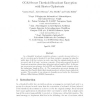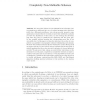70 search results - page 5 / 14 » A Public-Key Encryption Scheme with Pseudo-random Ciphertext... |
CRYPTO
2011
Springer
12 years 7 months ago
2011
Springer
In CRYPTO 1997, Canetti et al.put forward the intruiging notion of deniable encryption, which (informally) allows a sender and/or receiver, having already performed some encrypted...
CORR
2004
Springer
13 years 7 months ago
2004
Springer
Chebyshev polynomials have been recently proposed for designing public-key systems. Indeed, they enjoy some nice chaotic properties, which seem to be suitable for use in Cryptogra...
IACR
2011
12 years 7 months ago
2011
Identity-based decryption is an alternative to identity-based encryption, in which Alice encrypts a symmetric key for Bob under a trusted authority’s public key. Alice sends Bob...
PROVSEC
2007
Springer
14 years 1 months ago
2007
Springer
In a threshold broadcast encryption scheme, a sender chooses (ad-hoc) a set of n receivers and a threshold t, and then encrypts a message by using the public keys of all the recei...
ICALP
2005
Springer
14 years 29 days ago
2005
Springer
Abstract An encryption scheme is non-malleable if the adversary cannot transform a ciphertext into one of a related message under the given public key. Although providing a very st...



